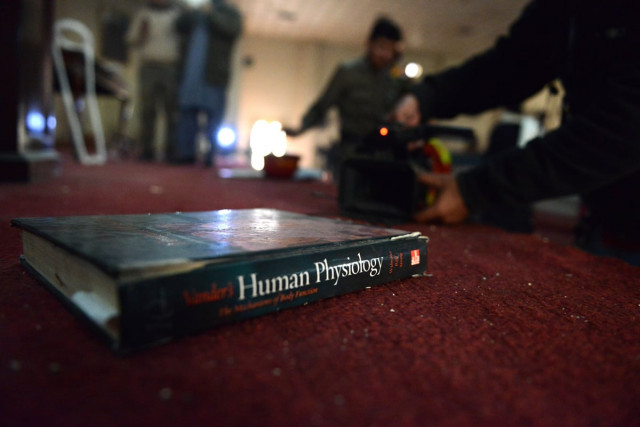Safe schools: ‘Greater preparedness reduces damage’
Experts at a seminar discuss interventions to secure educational institutions in the province.

Primary school students are too young to take care of themselves. It is necessary to sensitise them regarding security issues in order to make them more responsive in emergency situations, School Education Department (SED) Deputy Secretary Qaiser Rasheed said at a seminar held last week.
Several law enforcement, government policy, and education experts discussed various plans of action to secure schools in the Punjab. The event was held in view of a security alert after the attack at a school in Peshawar this month. The Pakistan Girls’ Education Initiative (PGEI) Punjab organised the seminar in collaboration with the UNICEF and the SED. The speakers said raising awareness, holding trainings and allocating sufficient resources were the only ways to ensure safety at schools.

Ahmed Ali, a research fellow at the Institute of Social and Policy Sciences, said, “We need to know our limitations in order to work on implementation.” He stressed the need to synthesise political and technical measures to make informed policy interventions. Rasheed spoke on the need to take measures to elicit appropriate response from students in emergency situations. He said allocating resources for safety measures must be made a priority for all stakeholders in the future. He spoke about disaster-risk reduction and disaster-risk management and their implementation in schools.
Nawaz Khalid of the Provincial Disaster Management Authority said the authority had drafted Development of Minimum Operating Security Standard – minimum security standards for all schools, including private institutions, in the province. “Securing our schools is our first priority,” Khalid said. “We need to build safer schools and make them more resilient.”
Khalid discussed how children had been affected by natural disasters in the past – around 18,000 children were affected in 2005 earthquake and 40,000 in the 2010 monsoon floods. “If we teach children appropriate responses in case of emergency situations, they will take the awareness message forward and help many more people.”
Operations DIG Dr Haider Ashraf said they had circulated detailed SOPs to all heads of schools. “What we witnessed in Peshawar is one of the most gruesome incidents we have come across.” He said the police had formulated a comprehensive security plan under which more than 300 police personnel had been deployed at various schools. Police officials were conducting surveillance drives at schools, school heads had been asked to ensure boundary walls, barbed wires on the walls and security guards and install surveillance cameras on the school premises. Ashraf said they had taken all stakeholders on board.
“We will do everything within our means to secure schools and children. We also need to motivate and educate our children, teachers and parents regarding safety measures.” Several members of the provincial assembly present at the seminar suggested various interventions, including holding trainings for schools at the district level, strict implementation of traffic laws, using biometric verification (thumb scans) to mark attendance at schools and expanding awareness mobilisation campaigns.
Punjab Civil Defence Director General Dr Farah Masood said they needed to focus on preparation and prevention. She said there was a lot of room for improvement in terms of preparedness. Dr Masood said they had held several trainings for students and teachers at schools and colleges in the past which had greatly helped them prepare for possible emergencies. “Greater preparedness reduces damage.” He said there was need for sufficient investment. “If we tell schools to sustain damage incurred by natural disasters, we need to realise that they are capital-intensive.”
Rescue 1122 Director General Dr Rizwan Naseer said emergency evacuation plans had been designed for schools and Rescue-1122 would start holding training sessions at all schools in the province in this regard. He said by January, the trainings would be completed with help from the SED. “Attacks on schools is a new challenge.”
He stressed the need to promote community watch. “We can’t turn our schools into fortresses. But we need to take collective responsibility and keep a watch on our surroundings.”
Published in The Express Tribune, December 29th, 2014.



















COMMENTS
Comments are moderated and generally will be posted if they are on-topic and not abusive.
For more information, please see our Comments FAQ